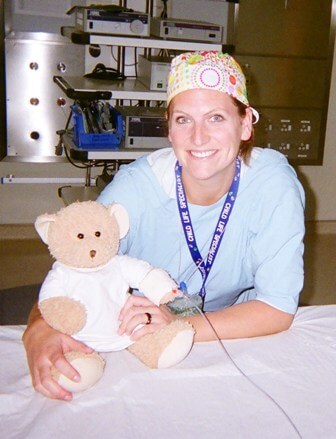
Summer 2015 marks the five year anniversary of the founding of the Standish Foundation for Child and Family Centered Healthcare. We’re celebrating by sharing the stories of some of the people that have worked alongside us.
From Advisory Council Member Caroline Hargrave Armington, MS, CCLS
Pediatric healthcare providers deliver outstanding compassionate care on a daily basis all over the world. However, in many cases the volume and extent of patient needs vastly outweighs the resources available. Throughout my involvement with the Standish Foundation for Child and Family Centered Healthcare (SF4C), I have witnessed how the Foundation’s powerful supportive initiatives alleviate these challenges and positively impact hospitalized children and their families.
In 2008, while piloting child life programming in South Africa, I was put in touch with Andrea (Andy) Standish who provided many helpful insights and a wealth of knowledge regarding international program development. Upon my return to the United States, I became a member of the Foundation’s Advisory Council and was honored to be appointed Liaison to the Board of Directors in 2010. The following five years brought tremendous growth for the foundation as it set root and flourished.
Part of this growth was the formation of the Advisory Council whose members include a diverse multidisciplinary team made up of doctors, nurses, child life specialists, inventors, educators and parents of children treated in hospitals. This incredibly ambitious and dedicated team of individuals provides a wide scope of practice and cultural perspectives spanning the globe.
It is largely due to the extensive experience of SF4C participants that the foundation stands poised to make important contributions in a variety of international healthcare settings. This multidimensional team has worked together sharing their expertise and field experience to develop the Passion for Caring curriculum which provides training in relevant topics for healthcare providers at partnering hospitals. The curriculum modules are selected and tailored based on assessment and collaboration with each partnering hospital to be adapted for successful application in each setting.
One of the greatest successes over the past five years has been the collaboration with partnering hospitals. In 2014, I joined Andy and fellow Advisory Council Member, Susan Clancey, at Augusta Victoria Hospital (AVH) in Jerusalem. Part of our role was to meet with, observe, interview and assess the healthcare providers and facility at this beautiful hospital in an effort to create needs-based recommendations. It was immediately clear that there was an abundance of compassionate practitioners caring for the patients seen at AVH. By working together with AVH’s medical staff, administrators and leaders we were able to identify areas of great success as well as areas of strain on practitioners which later led to the selection of Passion for Caring modules which would be most beneficial for them.
During this visit, we also led a retreat for practitioners and administrators to provide an introduction to self-care initiatives. This group engaged in relaxation and self-expressive exercises that most had never seen before, extending beyond the familiar as they processed individually and in teams. The following day, one of the doctors pulled us aside to say that for the past 24 hours since the retreat he had felt a calm and clarity he had not experienced for years. By having them actively participate, they could experience for themselves the benefits and importance of self-care for providers; a critical and often overlooked element to ultimately provide the best possible child and family centered healthcare.
Since my 2014 visit to AVH, another team of SF4C Advisory Council Members returned to implement three Passion for Caring workshops for healthcare providers. Following this visit, medical play sessions to help empower children and procedural support to enhance coping and mastery were initiated by trained AVH providers with very positive feedback from children and their families as well as staff.
Children do not arrive at the hospital in a bubble; they arrive fully immersed in a family system, community and culture. Similarly, healthcare providers do not provide care within a bubble. Each member of the medical team and hospital staff, from the first person the child sees when they walk in the door, to first person they see waking up from anesthesia, has the power to shape the experience of that child and his/her family. The SF4C has already made great strides to promote concepts such as this on a global scale and it will be exciting to see what the future holds for the many children and families who stand to benefit.
